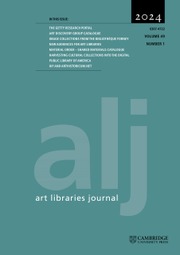No CrossRef data available.
Article contents
The library examined: A workshop collaboration between OOMK, Thick/er Black Lines and Senate House Library
Published online by Cambridge University Press: 15 April 2019
Abstract
The Library Examined was a workshop held in January 2018 at Senate House Library, University of London. The workshop was designed and facilitated by Heiba Lamara and Rose Nordin from OOMK and Hudda Khaireh from Thick/er Black Lines in discussion with Laurence Byrne and Leila Kassir, Research Librarians at Senate House Library. The Library Examined was aimed at non-library-card-holders with the ambition to help demystify library processes and spaces and to provide a forum for the discussion and critiquing of the organisation of knowledge within the library. This article describes in the first three sections the librarians’ view of the workshop and why it was initiated, before Heiba and Hudda outline their invitation and research, and the workshop itself.
A version of this paper was presented at the annual conference of ARLIS UK & Ireland held at the Architectural Association, London, in July 2018.
- Type
- Research Article
- Information
- Art Libraries Journal , Volume 44 , Special Issue 2: Critical Art Librarianship , April 2019 , pp. 78 - 82
- Copyright
- © ARLIS, 2019
References
1. Beilin, Ian. “The Academic Research Library's White Past and Present.” in Topographies of Whiteness: Mapping Whiteness in Library and Information Science, edited by Schlesselman-Tarango, Gina, Sacramento, CA: Library Juice Press, 2017 pp. 77–96Google Scholar
2. Mellon, Constance A. “Library Anxiety: a Grounded Theory and its Development.” College and Research Libraries, Vol.47, No.2, (1986), pp. 160–165CrossRefGoogle Scholar
3. Howard, Sara A. and Knowlton, Steven A. “Browsing Through Bias: the Library of Congress Classification and Subject Headings for African American Studies and LGBTQIA Studies” Library Trends, Vol. 67, No.1, (Summer 2018), pp. 74–88CrossRefGoogle Scholar
4. Olson, Hope. “The Power to Name: Representations in Library Catalog,” Signs, Vol. 26, No. 3 (Spring, 2001), pp. 639–668CrossRefGoogle Scholar
5. Wytner, Sylvia “Is ‘development’ a Purely Empirical Concept Or Also Teleological?: A Perspective from ‘we the Underdeveloped.’” in Prospects for recovery and sustainable development in Africa, edited by Yansane, Aguibou Y. (Westport, CT: Greenwood Press, 1996), 299–316Google Scholar
6. Silva, Denise Ferreira da. Toward a Global Idea of Race. Minneapolis: University of Minnesota Press, 2007Google Scholar




